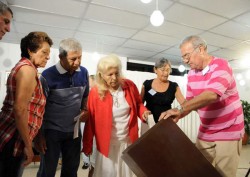
The results of the ballots –the so-called “elections”- in Cuba this past October 21st were reported in the official media as a demonstration of the people’s loyalty to the Revolution, which is to say, an example of allegiance to the government. Nothing new in that discourse. Every two and a half years, there is a repetition of the choreography in which government and “voters” play their role in the comedy, pretending to do their part: the former, holding elections, the latter, making choices.
Although this time the process featured more apathy than usual on the part of the voters, and the authorities were less irksome with propaganda, and even stopped the usual practice of niggling voters by sending Pioneers to insistently knock on doors of the most unlikely to go out and cast their votes, attendance figures again placed above 90%, as befits any self-respecting totalitarian regime. However, even if we gave credence to the official data, the number of dissenters was clearly endorsed at 1,161,431 Cubans of voting age who did not go to the polls, invalidated their ballots, or left them blank, three sufficiently clear ways to at least protest the lack of confidence in the system by a significant number of the population.
At any rate, the fear of retaliation and the zombie effect continue to be the norm in the population. A few days after the elections, I decided to make inquiries among voters in some neighborhoods of three of the more densely populated municipalities in the capital: Cerro, Diez de Octubre, and Centro Habana. Knowing how impossible it would be to organize a formal and complete survey, I thought it more expeditious to assume the position of a fellow citizen innocently seeking information needed for a personal matter, and to improvise, according to the situation. My objective was to confirm what we all know, including voters who vote in an effective manner, that is, those individuals whose ballots are valid upon scrutiny, because they vote for only one of the candidates for delegate districts, they do so automatically. Even so, most of those who consider themselves party to the system ignore even the most basic information of their “elected”.
Thus, I showed up randomly in 46 different blocks of said municipalities, sometimes knocking on doors where an always rickety sign declared it to be the headquarters for the CDR; others, I would turn to any civilian strolling around the area or simply taking in the sights on his doorstep. In total, my questions were very basic, and, as I said before, I modified them whenever appropriate:
- Do you know who the district delegate is, his name, address, how I can get in touch with him and his schedule to meet with his constituents?
- Did you vote for the elected delegate?
- How do you get in touch with the delegate?
Only one housewife could give me a half-answer for the first question, because the delegate lived in her building, though she didn’t know where or when he held office hours. The rest, people would tell me they did vote –except in one case, when an individual answered, with some suspicion, that he was away on that day, and he wasn’t very communicative- though nobody could tell me with any certainty the name of their delegate, let alone his address or how to get in touch with him. Only three individuals told me that the candidate they voted for had been elected, but couldn’t quite remember his information (last names, address, etc.) “I think his name was Juan Luis or something like that”, “I think he lives in the green building around the corner” were some of the most accurate information I found. Other descriptions were even ambiguous: “He is military, bald-headed”, “Yes, of course, he’s a mulatto who hobbles a bit when he walks, but I don’t remember his name or where he lives.” As can be seen, people have a high political sense and a close bond with their representatives, as proclaimed in the official media.
As far as my many relatives and friends, close or not-so-close, the pattern was of similar behavior, though, of course, no one was reluctant to answer. Only one person admits voting for a delegate (a valid ballot), though he has no idea of his name or who the guy is. The rest voided their ballot with “D” or crossed it out. A smaller group and I did not go to the polls.
Certainly, my little “survey” is not worth any official purpose, but I invite any Cuban to verify for himself the truth in what I say. One does not have to be very sharp in his questionnaire. Any question about what led an individual to vote for one or another of the candidates, or about the nature of his expectations will immediately raise suspicions on the part of the surveyed and will only produce evasive answers. We have had over 5 decades of fear, and a lot of people still seem to sense a guardian dog of the regime behind any other Cuban. But they will be able to see without doubt that the official discourse stands on a scaffold so fragile that it would not withstand even the simplest poll of any agency qualified for such purposes.
Of course, a makeshift Cuban pollster would also run the risk of approaching the wrong person. He could stumble onto the most zealous “combatant” on the block, the one who sees “the enemy” behind the most innocuous question, and then the person conducting the survey might spend a night in a dungeon and get out after signing a “memorandum of warning “as punishment. I must confess that I’ve been lucky, or maybe the snitches and the Talibans are waning. I don’t know. That would be another kind of survey, that, I have to admit, I still don’t dare to perform.
Translated by Norma Whiting
November 5 2012
